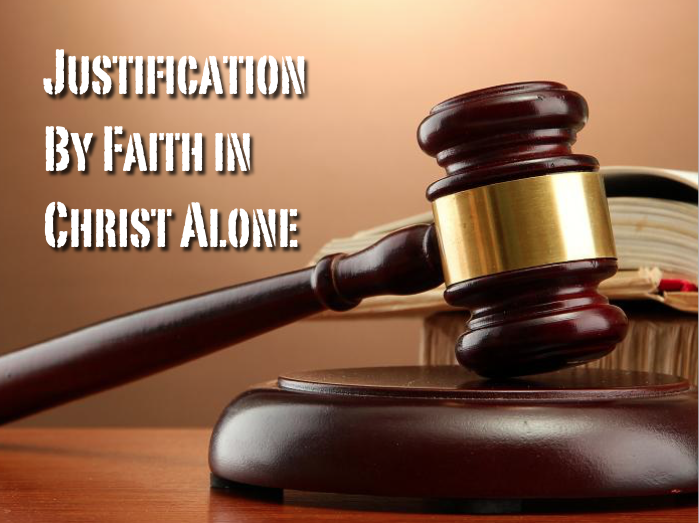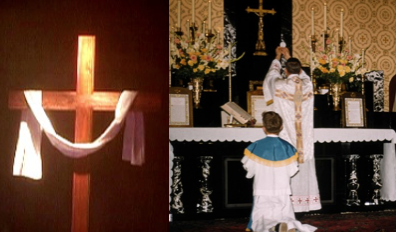First published in July 1990
Anti is a Greek prefix that not only means “opposed to” but “in the place of.”
Antichrist will indeed
oppose Christ but in the most diabolically clever way possible: by pretending to
be Christ. For the world to follow and worship him, a false Christianity must become the world religion—a “Christianity” that all religions can accept and that embraces all religions into “one faith.” Hence the necessity for today’s growing
apostasy : to create an apostate church to be the
Antichrist ’s earthly bride, just as the true church is Christ’s heavenly bride. Such is the important role of the New Age movement and the many accelerating delusions and seductions in these “last days.”
Through a false gospel, false prophets, occultic religious practices and lying “signs and wonders,” today’s churches are being filled with millions who call themselves Christians, but who are not. Left behind at the Rapture, and happy that the “negative” influence of the vanished troublemakers has been removed, they will worship and follow the
Antichrist , thinking he is the true Christ and that they have “never had it so good.” An ecumenized “Christianity,” in partnership with all religions, will carry on and prosper even more after the Rapture than before. The unifying factor will be concern for Mother Earth. Working for peace and ecological wholeness will have replaced truth as the basis of Christianity, as the World Council of Churches has already decreed.
Far from being a cop-out invented by those who desire to escape persecution (which could become very severe in America
before the Rapture), a pretribulation Rapture is essential for a number of reasons: first of all, to remove the true Christians from earth. If they were present when
Antichrist was revealed, they would oppose and expose him. Such opposition must be removed in order to give Satan and man, under
Antichrist ’s leadership, full freedom to prove that this earth can be turned back into a garden paradise without God. The Holy Spirit, who is omnipresent, will still convict and draw many to Christ during the Great Tribulation. The restraining influence, however, that He has wielded in this world through the millions of true Christians, will have suddenly been removed, leaving a moral and spiritual vacuum in homes, neighborhoods, businesses, and schools such as we cannot even imagine.
A pretrib Rapture is also necessary because the
Antichrist will be given authority by God “to make war with the saints, and to overcome them” (Rv 13:7). Such a fate could not befall the church, for Christ said that the “gates of hell shall not prevail against it” (Mt 16:18). Moreover, true Christians have authority and power to “resist the devil” and “he will flee” (Jas 4:7), for “greater is he that is in [us], than he that is in the world” (
1 Jn:4:4). So the fact that
Antichrist is given power by God “to make war with the saints and to overcome [i.e., kill] them” is proof that the true church is no longer present.
The “saints” mentioned are those who have not heard and rejected the gospel prior to the Rapture and who believe in Christ during the Great Tribulation. They will pay for their faith with their lives. Those who take the mark of the beast suffer the wrath of the Lamb, while those who don’t are slain by
Antichrist . Thus a post-trib rapture would be a classic nonevent, for there would be very few if any surviving believers to be raptured at that time. And surely those Christians who were left alive, seeing the judgment of God poured out upon mankind and earth’s armies gathered for the battle of Armageddon in an attempt to destroy
Israel , would know beyond the shadow of a doubt that the Second Coming was about to occur—and would be watching for their Lord to appear. Yet Christ declared that He would return at a time of such ease that even the “five wise virgins” would “slumber and sleep.” He warned, “[F]or in such an hour
as ye think not the Son of man cometh” (Mt 24:44). Hardly likely in the midst of the greatest tribulation and destruction the world has ever seen or ever will see!
To understand how the stage is being set for the final conflict between Christ and
Antichrist , it is helpful to consider some comparisons and contrasts between these two antagonists. First of all, the procession of events is in God’s hands. Although we cannot know the day or hour of our Lord’s return, the Bible does give us many clues as to the general timing of this great occurrence.
There is a precise time for Christ’s second coming just as there was for the first: “But when the fulness of the time was come, God sent forth his Son...” (
Gal:4:4). The same is true of the
Antichrist . Quite possibly already present in the world and waiting in the wings, this “man of sin” known as “that Wicked [one]” (
2 Thes:2:3,8) can only take power when it is God’s time: “And now ye know what withholdeth that he might be revealed
in his time” (2:6).
Interestingly, the Roman Empire plays an integral part in the timing for the revelation both of God’s Messiah and Satan’s. Ancient Rome set the stage for Christ’s birth: “And it came to pass in those days, that there went out a decree from Caesar Augustus, that all the world
should be taxed” (Lk 2:1). It was this decree that caused Joseph and Mary to be in Bethlehem so that Christ would be born there in fulfillment of Micah:5:2. And of course He also had to be executed during the time of the Roman Empire, which introduced crucifixion, in order to fulfill Psalm 22.
For Christ to return, the Roman Empire must be revived. This is clear from Daniel’s interpretation that the distinct parts of the image seen by Nebuchadnezzar “...head was of fine gold, his breast and his arms of silver, his belly and his thighs of brass, his legs of iron” (Dn 2:32-33) represented four world kingdoms: the Babylonian, Medo-Persian, Grecian and Roman. That the “feet and toes, part of potters’ clay, and part of iron” (2:41) represent the fourth world kingdom revived in the last days is clear from the statement, “And in the days of these kings [i.e., represented by the ten toes] shall the God of heaven set up a kingdom, which shall never be destroyed...[and] it shall break in pieces and consume all these kingdoms, and it shall stand for ever” (2:44).
Christ did not establish His kingdom the first time He came, so He must come again to do so. When? “In the days of those kings”—i.e., when the Roman Empire has been revived, out of which the
Antichrist will arise. No longer “as a lamb to the slaughter” (
Isa:53:7), but now returning in power and glory to execute judgment upon those who crucified Him, Christ will destroy this evil empire in its revived form at His second coming. So although the date is not given, the
timing of Christ’s return is clearly indicated.
It is also essential for the Roman Empire to be revived in order for the
Antichrist to appear. Daniel prophesied that “the people of the prince that shall come [i.e.,
Antichrist ] shall destroy the city and the sanctuary...” (Dn 9:26). The Roman armies under the command of Titus destroyed Jerusalem and the temple in AD 70. It is therefore from these people that the
Antichrist must arise. That doesn’t necessarily mean that he has to be Roman, since her legions came from many parts of the Empire. It does mean, however, that he must come from that world kingdom—and for that to happen, the Roman Empire must be revived. We are seeing the fulfillment of this most remarkable prophecy in our day.
Calling
Antichrist “the prince that shall come” indicates that he, like the ancient Caesars, will rule the Empire when it is
revived. Moreover, the ancient Roman Empire was not only a political, economic, and military entity but also a religious one with the god-emperor the head of the pagan priesthood. So in conjunction with a world
government, a world
religion headed by the new Caesar, the
Antichrist , must be established in the last days, exactly as Revelation 13 indicates.
During the periodic waves of Roman persecution that the early Christians endured, all citizens of the Empire were required to bow down to an image of the current Caesar and worship him as god. Those who did not were killed. Such will also be the case under
Antichrist in the
revived Roman Empire: “And all that dwell upon the earth shall worship him, whose names are not written in the book of life...[and] as many as would not worship the image of the beast [
Antichrist ] should be killed” (Rv 13:8,15).
The contrasts between Christ and
Antichrist are also instructive. Our Lord was despised and rejected by
Israel and by the world: the
Antichrist will be hailed and embraced. Christ was mocked and jeered: the
Antichrist will be praised. The cry of those who rejected Christ was, “We’ll not have this man to reign over us!” It is incredible to realize that in contrast the
Antichrist will be accepted not only by the world but by
Israel as well. Jesus told the Jewish leaders in His day, “I am come in my Father’s name, and ye receive me not: if another shall come in his own name, him ye will receive” (
Jn:5:43).
Christ’s kingdom of light and truth is heavenly (“My kingdom is not of this world” -
Jn:18:36);
Antichrist ’s kingdom of darkness is built upon a lie and is totally of this world. It is sad to see so many evangelical Christians becoming increasingly entangled in this world, joining with Catholics, Mormons and other cultists and occultists to pursue its political and social agendas—and in the process losing their hope of heaven. It was characteristic of the early church that they knew they were the
ekklesia, the called-out ones, who were no longer of this world (
Jn:17:6,14,16) but were eagerly waiting (
1 Thes:1:10) and watching for Christ to return to take them to heaven (
Heb:9:28;
Jn:14:2-3). That hope must be awakened!
Mystery surrounds both Christ and
Antichrist . Of Christ, Paul wrote, “great is the
mystery of godliness: God was manifest in the flesh...” (1 Tm 3:16). And of
Antichrist he wrote, “[T]he
mystery of iniquity doth already work” (
2 Thes:2:7). Each has a mysterious bride, one a virgin, the other a harlot. The mystery of godliness, which will be revealed in Christ’s bride, the church, has been “kept secret since the world began” (
Rom:16:25) and is “Christ in you, the hope of glory” (
Col:1:27). It can only be fully revealed at the last time (1 Pt 1:5).
The mystery of iniquity, which could conversely be called “Satan in you, the hope of damnation,” will also be revealed through a bride, the
Antichrist ’s. She is called “mystery, babylon the great, the mother of harlots and abominations of the earth” (Rv 17:5). As Christ loves and preserves His bride, so Satan will “hate the whore, and shall make her desolate and naked, and shall eat her flesh, and burn her with fire” (Rv 17:16).
The fact that the second coming of Christ in power and glory to rescue
Israel , destroy the armies that are about to destroy her, and to set up His kingdom upon the throne of His father David is a separate event from the rapture of His bride, the church, is very clear. Some try to make them one event by suggesting that we will be “caught up to meet the Lord in the air” on His way to earth and will immediately turn around and accompany Him to the Mount of Olives and His intervention at Armageddon. However,
Revelation:19:7-14 tells of Christ’s marriage to His bride
in heaven before He comes to earth to execute judgment and set up His kingdom.
A major purpose of the Second Coming is to destroy
Antichrist : “whom the Lord shall...destroy with the brightness of his coming” (
2 Thes:2:8). Thus it is clear that the Second Coming cannot take place until the
Antichrist has been revealed and has established his kingdom upon earth. If the Rapture were not a separate event from the Second Coming
before the
Antichrist is revealed, then Christians would not be watching, waiting, and looking for Christ, but for the
Antichrist , which is unthinkable!
One of the growing delusions today is the belief that the church is not to be raptured at all but that when we have taken over the world (and not until then), Christ will return to reign over the kingdom we have established for Him. Yet Christ promised, “And if I go and prepare a place for you [in heaven], I will come again, and receive you unto myself; that where I am, there ye may be also” (Jn:14:3). Paul wrote that “the dead in Christ shall rise first: then we which are alive and remain shall be caught up together with them in the clouds, to meet the Lord in the air [obviously to be taken home to His Father’s house of many mansions]: and so shall we ever be with the Lord [in heaven, where He has gone to prepare a place for us]” (1 Thes:4:16-17).
Instead, many who claim to be Christians are looking forward to meeting a “Christ” with their feet planted firmly on planet earth—a “Christ” who has not arrived to take them to heaven but to reign over the kingdom they have established for him. What a delusion! Such have not been working for the true Christ, but for the counterfeit, the
Antichrist . They have not been “lay[ing] up...treasures in heaven” (Mt 6:20), but have been building an earthly kingdom. May our Bridegroom reawaken our love for Him, and may our hearts, as it should be with a bride, long to see and be with Him!
TBC
Source: https://www.thebereancall.org/content/christ-and-antichrist




